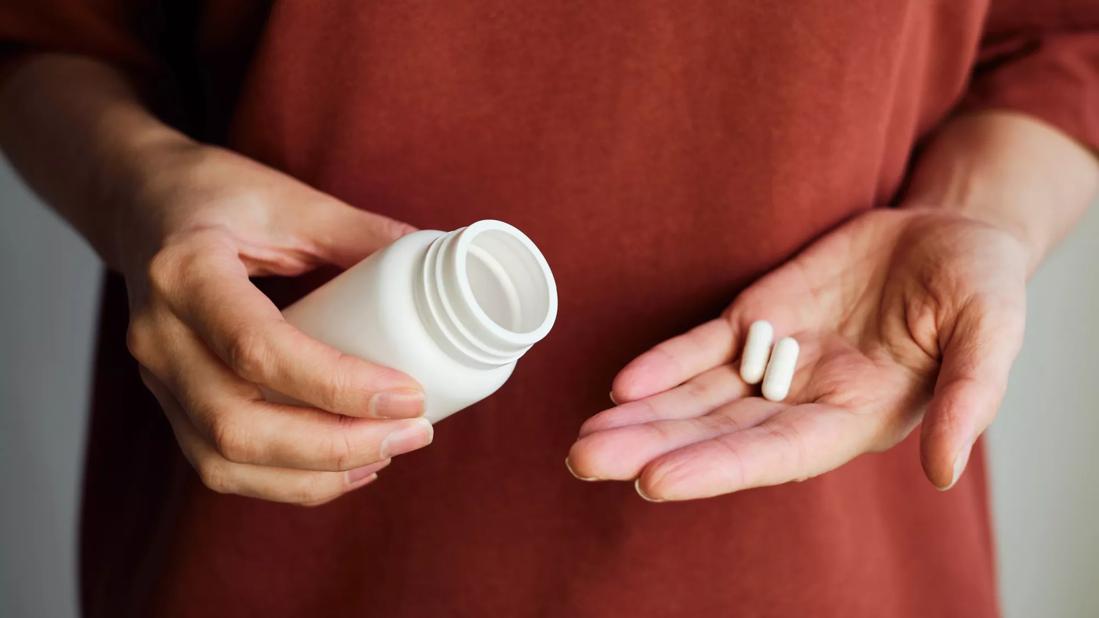Stay away from over-the-counter aids unless your doctor specifically recommends them

Nutrition is always important. But when you’re in (or approaching) menopause, your body is especially reliant on vitamins and nutrients to keep you healthy and strong as your estrogen production drops and your metabolism slows.
Advertisement
Cleveland Clinic is a non-profit academic medical center. Advertising on our site helps support our mission. We do not endorse non-Cleveland Clinic products or services. Policy
Don’t rush to the store to load up on pills and powders, though. Menopause specialist Pelin Batur, MD, explains which supplements can be helpful and which can be harmful — and why a healthy lifestyle should always be your first line of defense.
Wouldn’t it be nice if there were a magic pill or powder you could take to make menopause symptoms like hot flashes and weight gain just disappear? Alas, in nearly all cases, a healthy lifestyle does more for your body than any over-the-counter supplement can.
“Eating nutritious foods, taking good care of yourself, exercising — there’s a lot to be said for taking plain old good care of yourself,” Dr. Batur says. “Following fad diets and taking a bunch of supplements may help temporarily take off a few pounds, but if you’re not practicing a healthy lifestyle, you can still end up with health issues, including a huge decline in bone density during menopause.”
Eating a balanced diet of veggies, calcium and soy can go a long way toward relieving symptoms and ensuring that you get all the nutrients you need. But in some cases, supplements may be warranted.
There are no “best” supplements for menopause, per se, as you should always speak with a doctor before starting any vitamin or supplement.
Advertisement
“Supplements are unregulated and can cause serious health problems, like liver toxicity,” Dr. Batur cautions. “Just because something comes from a health food store doesn’t necessarily mean it’s safe.”
That said, here are some of the supplements your doctor may recommend around the time of menopause. Just be sure, as always, that you’re paying close attention to labels, warnings, dosage and, of course, your doctor’s expert advice.
Menopause contributes to bone loss, and calcium is critical to bone health. If you’re already eating a lot of calcium-rich foods, like dairy products and leafy greens, you may be getting enough calcium through your diet.
“Dietary calcium is preferable to supplements whenever possible,” Dr. Batur says, “but if you have gastrointestinal issues or lactose intolerance, you may not be able to get adequate dietary calcium.”
If you’re not getting enough through food, your doctor may OK a calcium supplement to help you reach the recommended 1,000 to 1,200 mg a day (depending on your age).
Don’t jump on the calcium supplement train “just because,” though. If you’re already getting enough calcium to keep that skeleton sturdy, steer clear of supplements. Too much can contribute to hypercalcemia, a build-up of calcium in your bloodstream.
“Calcium is a safe supplement overall, but just like anything else, it should be taken in moderation,” Dr. Batur says. Plus, it can make you constipated!
Sometimes known as the “sunshine vitamin,” vitamin D is critical for calcium absorption, among other aspects of your health. Some people can get enough of it through sun exposure (don’t forget to wear sunscreen!) and foods that contain vitamin D.
But if you’re headed toward menopause, you may be at risk for a deficiency, so ask your doctor about vitamin D supplements. Recent studies suggest that routinely taking vitamin D supplements are unlikely to help most people, though your doctor’s recommendations will vary depending on your individual health and risk factors.
Taking too much vitamin D can cause your calcium levels to rise — and not in a good way. If you’re taking vitamin D, follow your healthcare provider’s instructions to be sure you’re taking a dosage that’s safe for you — typically a dose of 2,000 international units or less is considered safest.
Research is mixed on whether flaxseed (also known as linseed) can ease hot flashes, as some people claim it can. Still, these tiny seeds have big health benefits — but in ground form, not supplements.
Advertisement
Ground flaxseeds contain omega-3s and lignans, which may decrease your risk of breast cancer and lower your cholesterol. This makes them a healthy addition to your diet, even if they don’t bring relief from hot flashes.
“Flax does contain phytoestrogens, which are substances that can have estrogen-like effects on body tissues and cells,” Dr. Batur notes, “so check with your doctor if you’re being treated for uterine or breast cancer.”
Hold off before shelling out for this supplement. Some studies suggest that black cohosh, a member of the buttercup family, may help relieve hot flashes and night sweats. But most studies suggest (and most doctors agree) that it doesn’t work any better than a placebo.
“This means that about 30% of people who use black cohosh supplements get benefit because of the healing effects of positive thinking, as opposed to the supplement itself,” Dr. Batur says.
If you do choose to take black cohosh, it should only be used for fewer than six months. “There are some concerns about liver safety, and there have been reports of liver failure,” she warns.
Because black cohosh may cause liver issues, you shouldn’t take it if you have a known liver disorder. And even if you don’t, be aware that its side effects can include cramping, headaches, nausea and an upset stomach.
Advertisement
The supplement industry is an unregulated one, making it the Wild West of over-the-counter health products — which can be seriously dangerous, even if you’re taking something “natural.”
“When you’re getting a vitamin or mineral from foods, that’s natural and safe,” Dr. Batur says. “When it’s put into a manmade form, though, like a pill or a powder, then it essentially becomes an unregulated chemical.”
Dr. Batur walks us through some of the supplements you should avoid, for the sake of your health and your wallet:
Advertisement
Some people breeze through menopause without issue, while others experience significant discomfort, from sweaty nights to swollen breasts and beyond.
Lifestyle changes like diet modification and stress management can go a long way toward relief — but if you find that your menopause symptoms are interfering with your quality of life and your overall well-being, ask a healthcare provider for guidance and support.
To learn more on this topic from Dr. Batur, listen to the Health Essentials Podcast episode, “What to Expect in Menopause.” New episodes of the Health Essentials Podcast publish every Wednesday.
Learn more about our editorial process.
Advertisement

Estrogen loss contributes to bone loss, which significantly raises your risk of osteopenia and osteoporosis

Making certain changes to your diet, sleep habits and even your wardrobe may help lessen the impact of menopause symptoms

A women’s health specialist explains those cold flashes that come on quickly

Changing hormone levels can bring issues like brittle nails, indigestion, dry skin and new allergies (to name a few!)

The choices you make at mealtime could reduce hot flashes or make them worse

If you’ve noticed changes in your mood and mental health while going through menopause, you’re not alone

Missed periods, heavy periods, painful sex and frequent hot flashes are just a few symptoms worth discussing with your provider

At-home tests measure FSH levels in urine, but they can’t actually diagnose menopause

The tropical fruit is a good source of antioxidants and vitamin C

Most people fall asleep within 10 to 20 minutes, but if your experience is different, adjusting your sleep schedule may help

Exploring your hidden side can lead to better understanding of what makes you tick